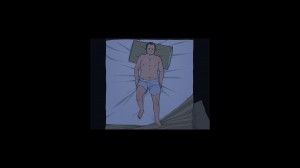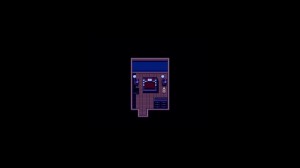written by David Steffen
A ctual Sunshine is an RPG-styled story of depression released by Will O’Neill in April 2014. It follows the life of young single overweight
ctual Sunshine is an RPG-styled story of depression released by Will O’Neill in April 2014. It follows the life of young single overweight
professional who is struggling with depression. He lives alone, is unsatisfied at his corporate job. Every day is a struggle, trying to get through the day of work, trying to connect with women, trying to do something with his life instead of just sinking into video games to avoid trying to do something with his life. As the game goes on, Evan experiences good days, bad days, changes at work, failed interactions with women, and more. Evan expresses his stories about depression by making up fake scenarios in his head conveyed in text, imagining he was a celebrity being interviewed on a TV show about his depression, talking to an imaginary therapist, etc.
 An in-game note suggests that the game is at least somewhat autobiographical, which makes it a little awkward to criticize it. It’s not that I doubt the authenticity of the story, or the difficulty of living with depression. I don’t suffer from depression, but I have close family and friends who do, and some who have given up hope and committed suicide. It is a horrible thing to go through, which is misunderstood by so many. I heartily approve of something which helps spread the conversation about depression so that those who haven’t been through it can understand some small part of what the depressed are going through.
An in-game note suggests that the game is at least somewhat autobiographical, which makes it a little awkward to criticize it. It’s not that I doubt the authenticity of the story, or the difficulty of living with depression. I don’t suffer from depression, but I have close family and friends who do, and some who have given up hope and committed suicide. It is a horrible thing to go through, which is misunderstood by so many. I heartily approve of something which helps spread the conversation about depression so that those who haven’t been through it can understand some small part of what the depressed are going through.
But, and this is a big but for me, this is not a game. Yes, you have control, but as far as I could tell there was no branching of the storyline, nothing that I would do that would make any difference in the outcome. Maybe that’s meant to be a meta-statement about how you don’t have control of your life when you’re depressed? I don’t know, but if you put something up on Steam and charge $5 for it, I want to have some effect on it. To me it was kind of like buying a book online that’s advertised as a novel and only finding out after buying it that it’s a cookbook. It’s not that cookbooks are inherently bad, and the shape of a cookbook is similar to a novel, but I’d be pretty annoyed to find it full of nothing but recipes.
 If you’re interested in the idea of a game that simulates the experience of depression, I recommend instead playing Depression Quest (which I’ll review next week). Depression Quest is interactive, and lets you see the choices of your actions trying to cope with depression–you do have an effect and there are choices you can make that will end better or worse than others. It is also free to play with donations accepted, so if you’re not sure what you’ll think about such a game–I suggest you give that one a try and give a donation if you thought the experience was valuable.
If you’re interested in the idea of a game that simulates the experience of depression, I recommend instead playing Depression Quest (which I’ll review next week). Depression Quest is interactive, and lets you see the choices of your actions trying to cope with depression–you do have an effect and there are choices you can make that will end better or worse than others. It is also free to play with donations accepted, so if you’re not sure what you’ll think about such a game–I suggest you give that one a try and give a donation if you thought the experience was valuable.
Visuals
Typical for the era of RPG the RPGMaker.
Audio
Not a lot of audio that I noticed, but one redeeming factor was a sequence where the protagonist imagines he’s a celebrity being interviewed on TV about his depression and his answers are all humorous-like off-the-cuff comments like you’d expect to hear from an actor talking about their life, but instead are actually dark comments about his depression but made quite creepy by the laugh line audio overlaid on it.
Challenge
No challenge. It’s just going through the motions to pass through the game.
Story
Things happen, and things change in the protagonist’s life, but I think it would be charitable to call those things a story. It’s more of a slice of life than a story to me. The imaginary asides in text about the imaginary tales of Evan’s life I did not find as enthralling as the game seemed to think they should be.
Session Time
Can save at any time you’re not in the middle of a cut sequence, so usually pretty easy to pick up and put down at will.
Playability
Nothing to it.
Replayability
None.
Originality
I admit, it’s the first time I’ve seen a game based around the experience of depression. There’s probably a reason for that–it’s not an easy thing to base a game around. (I’ve since played Depression Quest, so the other is technically the 2nd game on the subject I’ve played)
Playtime
It took me an hour to play through the game–and that was with me exploring everything I could find to explore.
Overall
The list price on Steam is $5. I would not recommend it. If you find the idea of a game experience describing depression appealing, I suggest trying Depression Quest instead.
